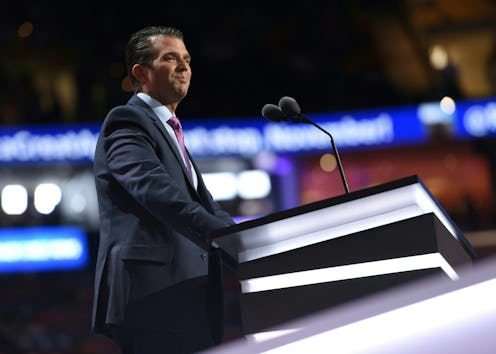News
Donald Trump Jr. Used A Gas Chamber Metaphor
Throughout his presidential run, Donald Trump and his campaign have faced not-unwarranted accusations of anti-Semitism. On Thursday, the latest anti-Semitic concern came from Donald Trump Jr, whose "gas chamber" reference in an interview raised red flags. Speaking with Chris Stigall on Talk Radio 1210 WPHT, the Republican presidential candidate's son accused the media of playing favorite with Hillary Clinton:
The media has been her number one surrogate in this. Without the media, this wouldn’t even be a contest, but the media has built her up. They’ve let he slide on every indiscrepancy, on every lie, on every DNC game trying to get Bernie Sanders out of this thing. If Republicans were doing that, they’d be warming up the gas chamber right now.
References to gas chambers tend to evoke the Holocaust and, thus, are not to be made lightly when they are not directly about the Nazis killing millions of Jews in a systematic way. Trump's "gas chamber" remark also alludes to anti-Semitism in that he is talking about "the media." For those unaware, there is a widely-held stereotype that Jews "control the media," a stereotype that is often embraced by the alt-right and other white supremacist movements. I will make the editorial decision not to link to the treasure trove of anti-Semitic conspiracy theory site that appear when one Googles "Jews," "media," and "control" in various combos.
I'm an American Jew, and I hesitate to declare whether all American Jews will be offended by Trump's "gas chambers" remark. Personally, I do not find it to be explicitly anti-Semitic, but I do think it falls into that category of dog-whistling the Trump presidential campaign is frighteningly good at working with so often.
Donald Trump Jr.'s remark quickly reminded of the now-infamous "sheriff star" tweet from July. The tweet about Clinton being "the most corrupt candidate ever" featured her face against a pile of money and a six-pointed star, which is usually considered a Star of David and marker of Judaism. Reports found the image was originally shared on a white supremacist site. After receiving criticism, Trump tweeted the same image, but with a circle where the star — but he and his team still claimed there was nothing anti-Semitic even being hinted at in the tweet.
I also thought of how Trump and his wife Melania actively refused to denounce the anti-Semitic death threats his supporters lobbed at reporter Julia Ioffe. When Ioffe wrote a less than rosy but by all accounts accurate profile of Melania for GQ, she was hounded with threats against her life and Holocaust imagery to the point where she filed a police report, citing she had faced “threat to kidnap or injure a person,” as noted by the Washington Post.
Yet, when CNN's Wolf Blitzer asked Trump to respond to his supporters' attack against Ioffe, he said “I haven’t read the article, but I heard it was a very inaccurate article... And I heard it was a nasty article." Melania's response was even more disturbing. In an interview with DuJour , Melania said, "I don’t control my fans." She added, “But I don’t agree with what they’re doing. I understand what you mean, but there are people out there who maybe went too far. She provoked them."
Donald Trump Jr.'s "gas chamber" remark isn't as bad as his father and stepmother's refusal to denounce anti-Semitic supporters. I think it would be remiss to frame it as such. It is also well worth pointing out that plenty of Democrats also more than hint at anti-Semitism in their dialogue. Democratic Rep. Hank Johnson of Georgia compared Jews in the West Bank to "termites" just this past summer. Nazis often referred to Jews as "vermin," so Johnson's words were especially disconcerting.
Still, the nonchalance with which Trump made his "gas chamber" remark is perturbing because it speaks to the larger tolerance the Trump presidential campaign has shown for anti-Semitism in its supporters. Moreover, it's further proof that as Trump's campaign heads into the home stretch of the election, it is still the same old campaign — very much for the worse.
